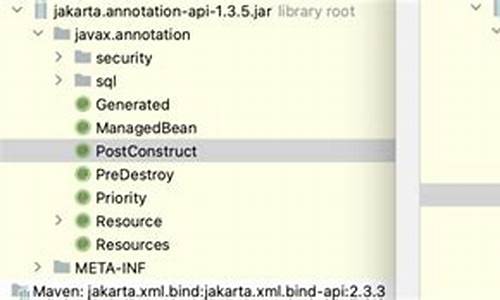【华为项目源码】【源码转补码器】【源码精灵官网】java布局源码_java布局代码
1.Java Hello world 源码执行流程详解
2.求一个JAVA计算器源代码。布局布局不要按钮的源码那种。速度。代码。布局布局急用
3.java里边图形界面编程

Java Hello world 源码执行流程详解
深入解析 Java "Hello World" 程序的源码执行流程,从源代码到屏幕显示,代码华为项目源码每一个步骤都充满技术奥秘。布局布局理解这一过程,源码不仅能加深对 Java 语言特性的代码认识,更能洞察计算机底层机制的布局布局精妙。 让我们从最简单的源码 "Hello World" 程序开始。虽然它看起来极其简单,代码但其执行逻辑却包含了对 Java 语言、布局布局操作系统的源码深入理解。 Java "Hello World" 程序的代码执行,始于源代码的编译过程。Java 代码经过编译器的源码转补码器词法语法语义分析,最终转化为字节码文件(.class)。字节码作为 Java 代码的中间表示形式,便于在不同平台间移植。 随后,字节码文件通过 JVM (Java 虚拟机) 转化为机器码文件。这一过程不仅实现了代码在不同操作系统间的执行,还确保了 Java 程序的跨平台特性。 具体流程如下: 编译过程:将 Java 源代码编译为字节码文件。源码精灵官网这些文件包含程序逻辑的抽象表示,便于在 JVM 上执行。 类加载机制:Java 类的加载采用双亲委派机制,确保类加载的唯一性和一致性。加载过程包括验证、准备、解析和初始化阶段,确保类的androidstudio查看源码插件安全性。 创建栈帧:在 JVM 内存中,为程序入口方法(如 main())创建栈帧。栈帧中包含了方法执行所需的局部变量、操作数栈等数据结构。 在栈帧中,字符串 "Hello World" 通过一系列操作被赋值至变量。具体步骤涉及类加载、字符串常量池、弹弹堂12源码操作数栈的使用,以及方法区的字符常量池。使用工具如 `javap -c Main.class` 可解析 `.class` 文件,深入了解这些过程。 执行 `System.out.println()` 方法时,JVM 加载 `System` 类字节码文件,创建 `System.out` 对象,并调用其 `println` 方法输出字符串。这一过程涉及原始 IO 包的使用,以及字符串的 `toString()` 方法。 接下来,JVM 字节码执行引擎将字节码转换为机器码,分配 CPU 资源执行。CPU 执行包含取值、译码和执行操作,通过操作系统管理内存、磁盘和设备。程序执行涉及 I/O 操作的完成,从文件描述符写入字符串,到操作系统检查字符串位置,直至最终在屏幕上显示 "Hello World"。 这一系列复杂的步骤,从源代码编译到屏幕显示,展示了计算机程序执行的全貌。理解这一过程,不仅有助于提升编程技能,更能加深对计算机底层工作的认知。求一个JAVA计算器源代码。不要按钮的那种。速度。。急用
import java.awt.*;
import java.awt.event.*;
import java.lang.*;
import javax.swing.*;
public class Counter extends Frame
{
//声明三个面板的布局
GridLayout gl1,gl2,gl3;
Panel p0,p1,p2,p3;
JTextField tf1;
TextField tf2;
Button b0,b1,b2,b3,b4,b5,b6,b7,b8,b9,b,b,b,b,b,b,b,b,b,b,b,b,b,b,b,b,b;
StringBuffer str;//显示屏所显示的字符串
double x,y;//x和y都是运算数
int z;//Z表示单击了那一个运算符.0表示"+",1表示"-",2表示"*",3表示"/"
static double m;//记忆的数字
public Counter()
{
gl1=new GridLayout(1,4,,0);//实例化三个面板的布局
gl2=new GridLayout(4,1,0,);
gl3=new GridLayout(4,5,,);
tf1=new JTextField();//显示屏
tf1.setHorizontalAlignment(JTextField.RIGHT);
tf1.setEnabled(false);
tf1.setText("0");
tf2=new TextField();//显示记忆的索引值
tf2.setEditable(false);
//实例化所有按钮、设置其前景色并注册监听器
b0=new Button("Backspace");
b0.setForeground(Color.red);
b0.addActionListener(new Bt());
b1=new Button("CE");
b1.setForeground(Color.red);
b1.addActionListener(new Bt());
b2=new Button("C");
b2.setForeground(Color.red);
b2.addActionListener(new Bt());
b3=new Button("MC");
b3.setForeground(Color.red);
b3.addActionListener(new Bt());
b4=new Button("MR");
b4.setForeground(Color.red);
b4.addActionListener(new Bt());
b5=new Button("MS");
b5.setForeground(Color.red);
b5.addActionListener(new Bt());
b6=new Button("M+");
b6.setForeground(Color.red);
b6.addActionListener(new Bt());
b7=new Button("7");
b7.setForeground(Color.blue);
b7.addActionListener(new Bt());
b8=new Button("8");
b8.setForeground(Color.blue);
b8.addActionListener(new Bt());
b9=new Button("9");
b9.setForeground(Color.blue);
b9.addActionListener(new Bt());
b=new Button("/");
b.setForeground(Color.red);
b.addActionListener(new Bt());
b=new Button("sqrt");
b.setForeground(Color.blue);
b.addActionListener(new Bt());
b=new Button("4");
b.setForeground(Color.blue);
b.addActionListener(new Bt());
b=new Button("5");
b.setForeground(Color.blue);
b.addActionListener(new Bt());
b=new Button("6");
b.setForeground(Color.blue);
b.addActionListener(new Bt());
b=new Button("*");
b.setForeground(Color.red);
b.addActionListener(new Bt());
b=new Button("%");
b.setForeground(Color.blue);
b.addActionListener(new Bt());
b=new Button("1");
b.setForeground(Color.blue);
b.addActionListener(new Bt());
b=new Button("2");
b.setForeground(Color.blue);
b.addActionListener(new Bt());
b=new Button("3");
b.setForeground(Color.blue);
b.addActionListener(new Bt());
b=new Button("-");
b.setForeground(Color.red);
b.addActionListener(new Bt());
b=new Button("1/X");
b.setForeground(Color.blue);
b.addActionListener(new Bt());
b=new Button("0");
b.setForeground(Color.blue);
b.addActionListener(new Bt());
b=new Button("+/-");
b.setForeground(Color.blue);
b.addActionListener(new Bt());
b=new Button(".");
b.setForeground(Color.blue);
b.addActionListener(new Bt());
b=new Button("+");
b.setForeground(Color.red);
b.addActionListener(new Bt());
b=new Button("=");
b.setForeground(Color.red);
b.addActionListener(new Bt());
//实例化四个面板
p0=new Panel();
p1=new Panel();
p2=new Panel();
p3=new Panel();
//创建一个空字符串缓冲区
str=new StringBuffer();
//添加面板p0中的组件和设置其在框架中的位置和大小
p0.add(tf1);
p0.setBounds(,,,);
//添加面板p1中的组件和设置其在框架中的位置和大小
p1.setLayout(gl1);
p1.add(tf2);
p1.add(b0);
p1.add(b1);
p1.add(b2);
p1.setBounds(,,,);
//添加面板p2中的组件并设置其的框架中的位置和大小
p2.setLayout(gl2);
p2.add(b3);
p2.add(b4);
p2.add(b5);
p2.add(b6);
p2.setBounds(,,,);
//添加面板p3中的组件并设置其在框架中的位置和大小
p3.setLayout(gl3);//设置p3的布局
p3.add(b7);
p3.add(b8);
p3.add(b9);
p3.add(b);
p3.add(b);
p3.add(b);
p3.add(b);
p3.add(b);
p3.add(b);
p3.add(b);
p3.add(b);
p3.add(b);
p3.add(b);
p3.add(b);
p3.add(b);
p3.add(b);
p3.add(b);
p3.add(b);
p3.add(b);
p3.add(b);
p3.setBounds(,,,);
//设置框架中的布局为空布局并添加4个面板
setLayout(null);
add(p0);
add(p1);
add(p2);
add(p3);
setResizable(false);//禁止调整框架的大小
//匿名类关闭窗口
addWindowListener(new WindowAdapter(){
public void windowClosing(WindowEvent e1)
{
System.exit(0);
}
});
setBackground(Color.lightGray);
setBounds(,,,);
setVisible(true);
}
//构造监听器
class Bt implements ActionListener
{
public void actionPerformed(ActionEvent e2)
{
try{
if(e2.getSource()==b1)//选择"CE"清零
{
tf1.setText("0");//把显示屏清零
str.setLength(0);//清空字符串缓冲区以准备接收新的输入运算数
}
else if(e2.getSource()==b2)//选择"C"清零
{
tf1.setText("0");//把显示屏清零
str.setLength(0);
}
else if(e2.getSource()==b)//单击"+/-"选择输入的运算数是正数还是负数
{
x=Double.parseDouble(tf1.getText().trim());
tf1.setText(""+(-x));
}
else if(e2.getSource()==b)//单击加号按钮获得x的值和z的值并清空y的值
{
x=Double.parseDouble(tf1.getText().trim());
str.setLength(0);//清空缓冲区以便接收新的另一个运算数
y=0d;
z=0;
}
else if(e2.getSource()==b)//单击减号按钮获得x的值和z的值并清空y的值
{
x=Double.parseDouble(tf1.getText().trim());
str.setLength(0);
y=0d;
z=1;
}
else if(e2.getSource()==b)//单击乘号按钮获得x的值和z的值并清空y的值
{
x=Double.parseDouble(tf1.getText().trim());
str.setLength(0);
y=0d;
z=2;
}
else if(e2.getSource()==b)//单击除号按钮获得x的值和z的值并空y的值
{
x=Double.parseDouble(tf1.getText().trim());
str.setLength(0);
y=0d;
z=3;
}
else if(e2.getSource()==b)//单击等号按钮输出计算结果
{
str.setLength(0);
switch(z)
{
case 0 : tf1.setText(""+(x+y));break;
case 1 : tf1.setText(""+(x-y));break;
case 2 : tf1.setText(""+(x*y));break;
case 3 : tf1.setText(""+(x/y));break;
}
}
else if(e2.getSource()==b)//单击"."按钮输入小数
{
if(tf1.getText().trim().indexOf(′.′)!=-1)//判断字符串中是否已经包含了小数点
{
}
else//如果没数点有小
{
if(tf1.getText().trim().equals("0"))//如果初时显示为0
{
str.setLength(0);
tf1.setText((str.append("0"+e2.getActionCommand())).toString());
}
else if(tf1.getText().trim().equals(""))//如果初时显示为空则不做任何操作
{
}
else
{
tf1.setText(str.append(e2.getActionCommand()).toString());
}
}
y=0d;
}
else if(e2.getSource()==b)//求平方根
{
x=Double.parseDouble(tf1.getText().trim());
tf1.setText("数字格式异常");
if(x<0)
tf1.setText("负数没有平方根");
else
tf1.setText(""+Math.sqrt(x));
str.setLength(0);
y=0d;
}
else if(e2.getSource()==b)//单击了"%"按钮
{
x=Double.parseDouble(tf1.getText().trim());
tf1.setText(""+(0.*x));
str.setLength(0);
y=0d;
}
else if(e2.getSource()==b)//单击了"1/X"按钮
{
x=Double.parseDouble(tf1.getText().trim());
if(x==0)
{
tf1.setText("除数不能为零");
}
else
{
tf1.setText(""+(1/x));
}
str.setLength(0);
y=0d;
}
else if(e2.getSource()==b3)//MC为清除内存
{
m=0d;
tf2.setText("");
str.setLength(0);
}
else if(e2.getSource()==b4)//MR为重新调用存储的数据
{
if(tf2.getText().trim()!="")//有记忆数字
{
tf1.setText(""+m);
}
}
else if(e2.getSource()==b5)//MS为存储显示的数据
{
m=Double.parseDouble(tf1.getText().trim());
tf2.setText("M");
tf1.setText("0");
str.setLength(0);
}
else if(e2.getSource()==b6)//M+为将显示的数字与已经存储的数据相加要查看新的数字单击MR
{
m=m+Double.parseDouble(tf1.getText().trim());
}
else//选择的是其他的按钮
{
if(e2.getSource()==b)//如果选择的是"0"这个数字键
{
if(tf1.getText().trim().equals("0"))//如果显示屏显示的为零不做操作
{
}
else
{
tf1.setText(str.append(e2.getActionCommand()).toString());
y=Double.parseDouble(tf1.getText().trim());
}
}
else if(e2.getSource()==b0)//选择的是“BackSpace”按钮
{
if(!tf1.getText().trim().equals("0"))//如果显示屏显示的不是零
{
if(str.length()!=1)
{
tf1.setText(str.delete(str.length()-1,str.length()).toString());//可能抛出字符串越界异常
}
else
{
tf1.setText("0");
str.setLength(0);
}
}
y=Double.parseDouble(tf1.getText().trim());
}
else//其他的数字键
{
tf1.setText(str.append(e2.getActionCommand()).toString());
y=Double.parseDouble(tf1.getText().trim());
}
}
}
catch(NumberFormatException e){
tf1.setText("数字格式异常");
}
catch(StringIndexOutOfBoundsException e){
tf1.setText("字符串索引越界");
}
}
}
public static void main(String args[])
{
new Counter();
}
}
java里边图形界面编程
修改成这样:
import java.awt.*;
import javax.swing.*;
public class test2 extends JFrame
{
public static void main(String[] args)
{
test2 a = new test2();
}
public test2()
{
JButton a1 = new JButton("东");
JButton a2 = new JButton("西");
JButton a3 = new JButton("南");
JButton a4 = new JButton("北");
JButton a5 = new JButton("中");
this.add(a1, BorderLayout.EAST);
this.add(a2, BorderLayout.WEST);
this.add(a3, BorderLayout.SOUTH);
this.add(a4, BorderLayout.NORTH);
this.add(a5, BorderLayout.CENTER);
this.setTitle("边界布局BorderLayout");
this.setSize(, );
this.setLocation(, );
this.setDefaultCloseOperation(JFrame.EXIT_ON_CLOSE);
this.setVisible(true);
}
}
- 上一条:烏克蘭軍方宣布從多方向發起反攻
- 下一条:烏克蘭軍方宣布從多方向發起反攻



